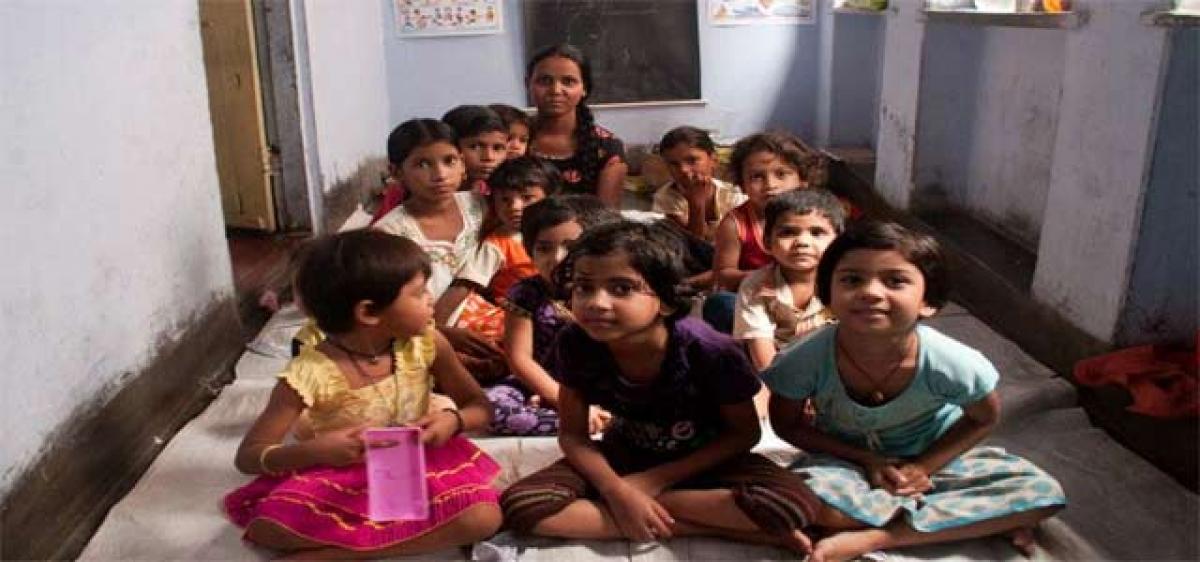Live
- Centre leveraging innovation, tech for capacity building among teachers
- Oppn members seek more time for JPC on Waqf Bill
- Grievances flood Lokesh’s Praja Darbar
- PM underscores need to link co-op movement with circular economy
- Why Rake Up The Issue After 44 Years? SC upholds ‘secular, socialist’ in Preamble
- Kia hits milestone of 1 lakh CKD exports from Anantapur plant
- Maha tussle delays formation of new govt
- Telangana spurns Adani benevolence
- Samajwadi MP among 400 charged for Sambhal violence
- Sansad Sangram Begins: Oppn stalls Parl over Adani issue, Manipur
Just In

If not, there will be a mismatch between the society needs and education. This has become a major hurdle in the achievement of academic standards and the surveys such as ASER, PRATHAM and NES have already established this.
The technological advancements have brought more changes in the lives of people in and out and both in rural and urban areas.
The technological advancement of the society, use of technical gadgets and explosion information and communication technology anticipates the techno literates instead of formal.
If not, there will be a mismatch between the society needs and education. This has become a major hurdle in the achievement of academic standards and the surveys such as ASER, PRATHAM and NES have already established this.
John Dewey’s remark” If we teach as we were taught yesterday, we rob our children of tomorrow” throws its weight on the evolving of contemporary Indian teacher as smart teacher.
India is one of the countries which have made education as right and is striving very hard to realise the objective of free and compulsory universalisation of education.
To accomplish this we need smart teachers instead of orthodox. To produce smart teachers provision of qualitative teacher training is in ICT is an essential part and it will help the system positively.
But, this area is so fragile in the existing system. Though on paper it looks easy; in reality teacher train is a hollow.
Once, our teachers have grabbed the attention of the world with their sound knowledge now it has become a tight walk on rope.
To raise our teachers’ proficiency we need collaboration of our training institutions with the techno giants in the area of teaching.
Thanks to the government which had made education as right for all but it also needs a design to accomplish that dream.
By strengthening the NCTE and promoting the utilisation of ICT in schools would greatly help to kick start the digital literacy.
India has an advantage with 45 per cent youth in population but if it fails to impart right skills in youth it will be hard to build a knowledge based economy.
For creating knowledge based economy we need a teacher tribe with sound technical caliber and the skill of using ICT in the classroom transaction and sound ethics.
For the realisation of needs of 21st century students in the classroom teacher must be a pedagogical ICT teacher.
Further, they should be prone to adopt themselves to infuse technology into their curriculum because they are the torch bearers of the society.
So, The Indian government should make it compulsory for teachers to have sound knowledge in ICT rather than giving training after. To realise the dream of digi-India we need first hand digi teachers and digi schools.
The International Society for Technology and Education (ISTE) an international professional association in its annexure 5 fixed the prerequisites for a teacher such as
1) Facilitate and inspire student learning and creativity with the aid of technology;
2) Design and develop digital age learning experiences and assessment;
3) Model digital age work and learning as a representative of global digital society;
4) Promote model digital citizenship and responsibility and to promote legal and ethical behavior in evolving digi culture;
5) Engage in professional growth and leadership to become role models in their community.In this digital era teacher should have to play a vital role as facilitator, councilor, designer and promoter of ICT in the arena of education.
It is a bad wish to anticipate a change in the pedagogical behavior of the country overnight at the same time it is not wise thing for a teacher to deny the technological advancement and its inclusion in his classroom transaction.
No teacher should forget the remark Marcus Tullius Cicero “What nobler employment, or more valuable to the state, than that of the man who instructs the rising generation?”
By: E Gajendra Nath Reddy

© 2024 Hyderabad Media House Limited/The Hans India. All rights reserved. Powered by hocalwire.com







